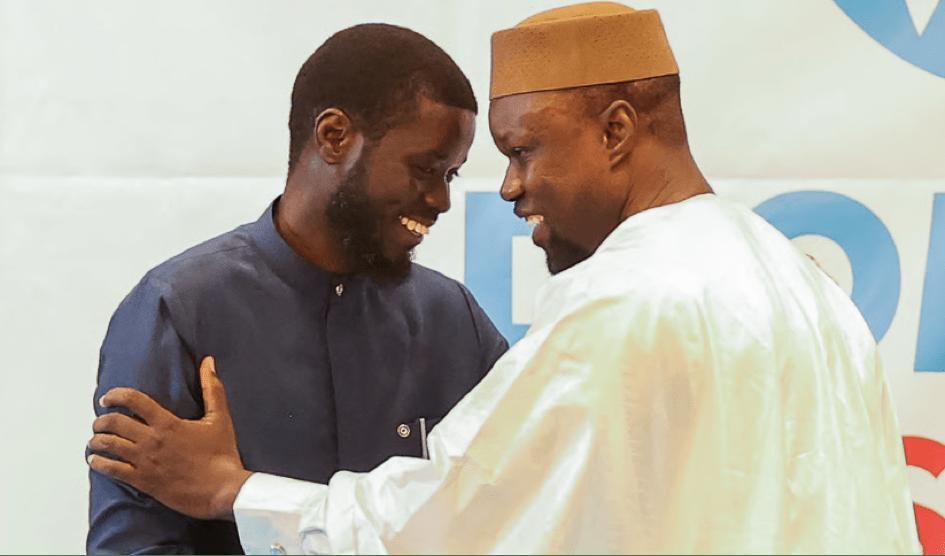Africa-Press – Gambia. The rapidly evolving political landscape in Senegal has become a spectacle of intrigue, stirring passionate debate across the region and beyond. From street corners to think tanks, people are interpreting the unfolding drama through a reflection of perspectives.
Among the most vocal are the revolutionaries who grasp the very soul of PASTEF. To them, the ideological heartbeat of the movement is unmistakably tethered to Ousmane Sonko, the firebrand visionary who conceived it in 2014 and carried it through its fiercest battles. They argue that while President Bassirou Diomaye Faye now wears the crown, he may not entirely comprehend the revolutionary spirit that fueled the rise of PASTEF. Worse still, seduced by the sweet intoxication of state power, he might be, inadvertently, eroding its foundations.
These devoted supporters warn that should President Diomaye choose to sideline Sonko, the man who inspired a generation and channelled popular energy into political power, he could be engineering his own downfall. It was Sonko, after all, who rallied the masses and essentially handed Diomaye the keys to the presidency. Severing that lifeline would not just be political ingratitude; it would be a strategic catastrophe. The case of Barthélémy Dias looms large in their memory. Once riding high on Sonko’s coattails, Dias believed he had arrived. But when he went solo in the last parliamentary elections, he didn’t just stumble, he crashed spectacularly, losing even his own ward. The moral lesson is evident that those who discard Sonko often find themselves discarded by the people.
Meanwhile, the opposition is practically salivating over any signs of a rupture. From Macky Sall loyalists to civil society cynics, a broad coalition is egging on a break-up between the two men. They believe that removing Sonko, the architect, the glue, the ideological compass, would render Diomaye rudderless and ripe for manipulation. They beat the drums of “independence” louder each day, parroting the line that Diomaye is the elected president and owes nothing to Sonko. Whether Diomaye hears the music or realises it’s a funeral march in disguise is anyone’s guess.
Enter the self-styled neutral observers-academics, analysts, and armchair philosophers-drawing lofty analogies and cautionary tales. One popular comparison is the fallout between Léopold Sédar Senghor and Mamadou Dia. When Senghor chose neocolonial continuity over revolutionary rupture and jailed Dia, he crushed a Pan-African dream that might have aligned Senegal with the likes of Nkrumah’s Ghana or Sekou Touré’s Guinea. The consequence was a postcolonial elite class fluent in French assimilation, but allergic to self-determination.
Others, stretching credibility, draw parallels with the rift between Gambian President Adama Barrow and Ousainou Darboe. But the differences are glaring. Barrow and Darboe were long-time bedfellows in the same UDP, with Darboe reportedly resisting Barrow’s candidacy from the start in 2016. In contrast, when Sonko was barred from contesting in 2024, he didn’t just endorse Diomaye, he activated the entire revolutionary machinery to ensure his victory. That’s not political convenience but ideological solidarity!
Perhaps the most haunting and instructive comparison is that of Burkina Faso’s Thomas Sankara and Blaise Compaoré. Sankara, the revolutionary hero, was betrayed and murdered by his own second-in-command, Compaoré, a man who neither shared nor understood the vision he once pretended to support. The revolution died with Sankara, buried beneath nearly three decades of authoritarian rule.
But these are not the 60s and 80s. Today’s Senegalese, and indeed African, citizens are more politically awake, less tolerant of betrayal, and far more connected than ever before. The days when stooges and traitors could hijack revolutions with foreign backing and a slick media narrative are fading. A Compaoré or Senghor would not last long in the social-media-driven glare of 21st-century scrutiny.
For those of us who still believe in the promise of PASTEF, there is room for cautious optimism. What many are interpreting as a fatal fracture might instead be a strategic pause, a recalibration necessary to secure the movement’s long-term viability. Revolutionary movements are rarely linear. They thrive on tension, grow through conflict, and mature through clarity.
If Diomaye and Sonko can weather this moment without succumbing to ego, ambition, or external manipulation, Senegal could well blaze a trail for a new form of revolutionary leadership in Africa, one that transcends personality cults, survives power transitions, and delivers on its promises.
Let’s not write the obituary just yet. Revolutions are born messy, and history has not finished writing Senegal’s chapter.
Source: The Standard Newspaper | Gambia
For More News And Analysis About Gambia Follow Africa-Press






